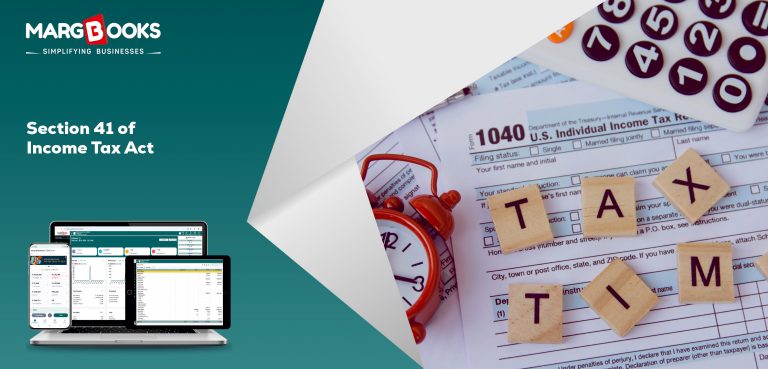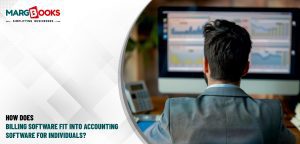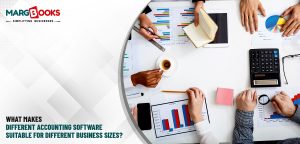When it comes to taxation in India, the law has various provisions to ensure that income — even if recovered or reversed later — doesn’t escape tax. One such important section under the Income Tax Act, 1961 is Section 41. If you’ve ever dealt with recovered expenses, remission of trading liabilities, or the sale of assets that were once written off, then this provision could apply to you.
In this blog, we’ll break down Section 41 of Income Tax Act in a simple, relatable manner. We’ll also explore its practical implications, examples, and how billing software and the best accounting software like MargBooks can help stay compliant.
🔍 What is Section 41 of Income Tax Act?
Section 41 deals with the taxability of recovered losses, deductions, or liabilities that were earlier allowed as expenses or losses. In simple terms, if an expense was allowed as a deduction in any previous year, and later on, the business recovers it — then it becomes taxable as income in the year of recovery.
It’s also commonly referred to as “deemed income”.
🧾 Scenarios Covered Under Section 41
Here are the main scenarios where Section 41 becomes applicable:
1. Recovery of Bad Debts (Section 41(4))
If you had written off bad debts earlier and claimed a deduction, and now you’ve recovered the money — it will be taxed as income.
Example:
In FY 2021-22, your business wrote off ₹50,000 as bad debts and claimed it as an expense. In FY 2024-25, you recover ₹30,000 from that customer. This ₹30,000 will now be taxed under Section 41.
2. Remission or Cessation of Trading Liability (Section 41(1))
If a liability shown in the books is either remitted (forgiven) or ceased without being paid, the amount will be taxed as business income.
Example:
Let’s say your vendor waives off ₹75,000 that you owed them. This waiver will be considered income under Section 41.
3. Sale of Assets Used for Scientific Research (Section 41(3))
If you sell an asset used in scientific research (for which you claimed a deduction), the sale proceeds will be taxable under this section.
4. Balancing Charge for Depreciable Assets (Section 41(2))
In case of depreciable assets like machinery or factory equipment, if you sell them at a value more than the written-down value, the excess is taxable (limited to the depreciation claimed).
📚 Why Does Section 41 Matter to Businesses?
Small and medium-sized businesses often forget that recovering an old bad debt or getting a liability waived off can have tax implications. But for the Income Tax Department, it’s still considered income, because a deduction was already claimed earlier.
Being unaware of this can lead to tax penalties, notices, or even interest on unpaid taxes. That’s why it’s crucial to track these recoveries properly and report them during tax filing.
💡 How Can MargBooks Help?
Keeping track of liabilities, bad debts, and asset depreciation manually is not only outdated, but risky. Here’s where MargBooks — one of the best accounting software for Indian businesses — makes all the difference.
✅ Benefits of Using MargBooks:
- Track Old Liabilities & Recoveries: Automatically records when a previously written-off expense or bad debt is recovered.
- GST-Ready Billing Software: Generate compliant invoices while keeping track of income streams, including recoveries under Section 41.
- Asset Management: Monitors depreciable assets and helps in identifying any balancing charges.
- Real-Time Reports: Helps in preparing accurate tax reports with minimal manual intervention.
- Cloud-Based Access: Access your data anytime, from anywhere.
Whether you’re a trader, wholesaler, manufacturer, or distributor — MargBooks gives you a comprehensive accounting and billing solution that ensures you’re never caught off guard by tax surprises.
📌 Key Points to Remember
Here’s a quick summary of what to keep in mind about Section 41 of Income Tax Act:
- Applies to recovery of previously claimed deductions.
- Covers bad debts, liabilities, scientific research assets, and depreciable assets.
- Taxable in the year the recovery or remission happens — not the year when it was written off.
- Must be included in ‘Business Income’ while filing Income Tax Return.
- Use tools like billing software and accounting software to track and manage such events effectively.
📝 Final Thoughts
In the world of accounting, it’s not just about what goes out — but also what comes back in. Section 41 of Income Tax Act ensures that if you’ve gained from something you previously claimed as a loss or expense, it gets taxed fairly. It’s an important provision for every business owner, accountant, and tax consultant to understand.
And if you’re looking to simplify compliance and automate your finances, MargBooks is your go-to choice. As one of the best accounting software in India with integrated billing software features, it takes care of all the complexities — so you can focus on growing your business, not worrying about tax notices.
Need help getting started with MargBooks?
Check out MargBooks official website and explore plans suited for your business.




